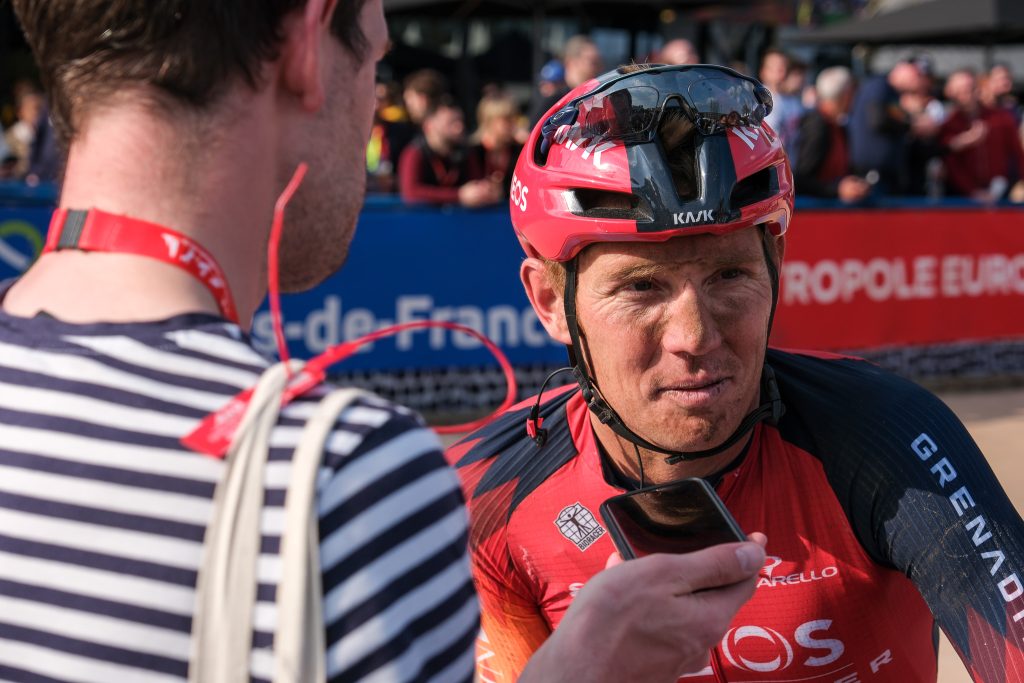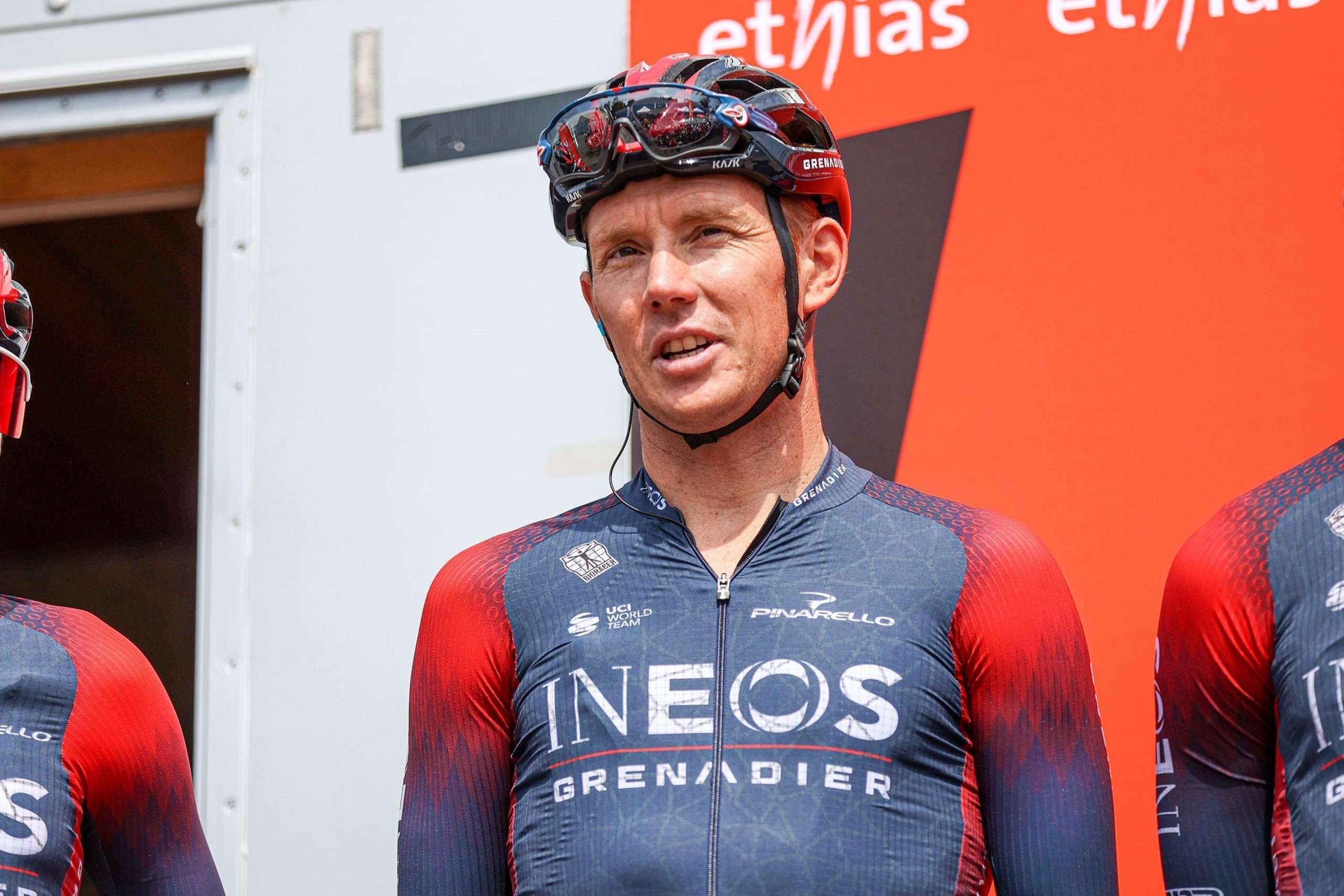Even after the morning mist dissipated in Compiègne, there was a tension in the air before the start of Paris-Roubaix. Whole seasons can rest on this race. Recovery, recons and energy conservation are everything. Contenders talking to the media weigh their words as carefully as race-winning attacks.
Then there’s the effervescent Cameron Wurf, bowling up with a thoroughly different preparation to his peers. “I’ve already run about 70 kilometres this week and swam 20. Tom Pidcock was up in Andorra so I got some good hours in on the bike as well,” he said.
This ray of sunlight arrived at the Ineos Grenadiers team bus in Compiègne, cracking jokes like a best man at a bachelor party.
“I just started my domestique duties early and carried everyone’s bags over, doing some Sherpa-ing,” he said. Tired already before the race? “Oh hell no, I’ve just got a lot more energy than them so I can afford to spend some.”
For the 2023 Paris-Roubaix, Ineos Grenadiers had the unusual distinction of having the race’s youngest and oldest competitors, in 19-year-old Josh Tarling, who fought to the finish just outside the time limit, and the 39-year-old Tasmanian. “I’d feel terrible for anyone if they’re older than me racing this thing today,” he said. “It’s quite an honour, isn’t it?”
On the eve of the race, Wurf took inspiration from watching another veteran, Tiger Woods, make the Masters cut for a record-equalling 23rd year in a row. “What a grinder, you know? I guess that’s what we’ve got to do today: grind this thing out. Have the last man standing.”
It might only have been Wurf’s third Roubaix start, but this isn’t his first rodeo. After starting out as a rower who went to the 2004 Olympics, he was a pro cyclist with Fuji-Servetto and Liquigas between 2009 and 2014 before retiring and pursuing triathlon success.
He joined Team Ineos in 2020, juggling his pursuit of Ironman silverware with a shortened schedule of bike racing. It’s working out too: he was 11th at the world championships in Kona last October.
“I’ve adjusted my training quite a bit in triathlon, tailoring it more towards being able to just jump in and race on the bike and I’ve felt much better on the bike than I have in previous years. I’ve felt a bit flat, a bit dull with late notice call-ups, but this year with the running, we’ve actually been doing a lot more speed work, same with the swimming.
And when I do get on the bike, I feel quite a bit more sharp. I’ve actually really enjoyed the bike racing this year, more than I probably have the last few years. I feel I can contribute a bit more towards the team.”
If there is a hole in a lineup due to injury, he’s the dependable guy to help the team and carry bottles. Then there’s the effect he has on everyone’s spirits – Pidcock calls him the team’s Chief Morale Officer.

Wurf was told five days before the race that the squad would need him for Paris-Roubaix, a little earlier than his 2022 race. “I actually had time to mentally prepare for it this time round. I just sat on my terrace at home and basked in the memories of last year, and figured we’d just go out and do it all over again.”
Lo and behold, he made it to the finish again, finishing 128th, 22:44 behind winner Mathieu van der Poel.
“I did what I could, I wasn’t able to follow all the attacks so I said to the guys that I’d sit at the back and be there for any problems,” he said.
He was a busy man, helping crash victims Magnus Sheffield, Luke Rowe, and Josh Tarling back to the bunch. Ahead, team leader Filippo Ganna rode to sixth after joining the break of aces. “It’s a fantastic result for him. To finish first, first you must finish so he’s finished pretty close. You’d have to back him in the years to come to pull this one off.”
The squad’s well-laid plans were affected by crashes to Michal Kwiatkowski and Ben Turner at Gent-Wevelgem and the Tour of Flanders. “We lost two of probably the most important cogs in the whole plan. And that probably affected Pippo a little bit, probably did hold him back from finishing any higher which is a real shame.”
“And obviously when you miss them and you’ve got to put in someone like me, it’s a bit of a demotion for the team,” he said, laughing. “I apologise there but you do your best and try to have a good attitude before the start, have all the guys believe they can go out there and do something. We tried to be among them the best, we fought for it again.”
“The Classics results in the past few years are a quantum leap compared to what they were doing in the past as far as consistency goes. We’ve just got to keep chipping away and the big wins will keep coming.”
As someone who had done 70km of running and 20km of swimming in the week before the race, does Wurf feel special or different? “Not really. I’ve actually done 200 kilometres of running in the last two weeks, I did 120k last week. I felt like I had tough legs, but I probably didn’t have explosive legs to go with the guys that have been racing the Classics campaign.”
“But no one cares about that when you start in one of the best teams in the world as part of the field. Today, while I probably didn’t contribute as much as I would have loved to, I was able to contribute so I guess it was better than having a man less on the start line.
“Anyway, I’ll go for a run when we get back to the hotel, finish off a good week of training, have a rest tomorrow and plan for Brabantse Pijl.”
I laughed, thinking he was joking. Yeah, right: some of his peers were lying in the infield, barely able to move.
A few hours later, Wurf’s upload appeared on Strava. 21 kilometres (a half-marathon, essentially) around the squad’s countryside base near Gent at a pace that would defeat most fresh mere mortals. Cameron Wurf, the iron man of Paris-Roubaix, you’re bonkers and brilliant.
What did you think of this story?

